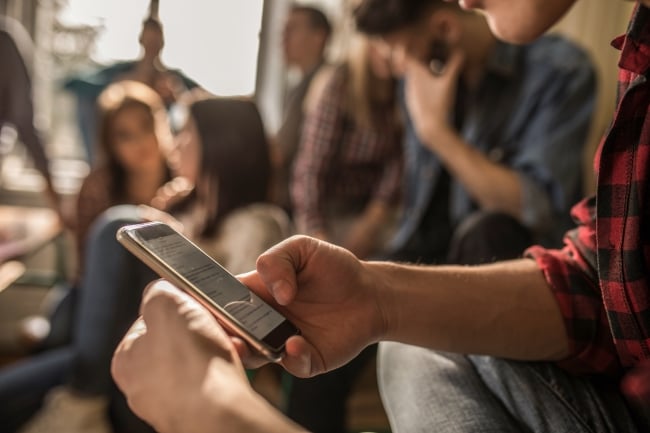You have /5 articles left.
Sign up for a free account or log in.

University-sponsored wellness applications make health information and education more accessible to students.
skynesher/E+/Getty Images
When it comes to being online, college students are one of the most well-connected groups, with Pew Research estimating 96 percent of 18- to 29-year-olds own a smartphone.
Some colleges are encouraging students to unplug from their devices for their mental health (Common Sense Media found teens check their phone over 100 times per day on average), but others are leaning into the nature of digital natives by using health and wellness apps.
While some such apps are available off the shelf for individual students or whole campuses to adopt, others are being developed in-house by administrators, staff and students.
University of Texas System: Thrive at UT
All the universities within the University of Texas system have a Thrive at UT app, first developed at UT Austin with counselors, students and faculty.
Thrive at UT covers eight topic areas: community, gratitude, self-compassion, mindfulness, mind-set, thoughts, moods and purpose. Each topic area features an inspirational quote, short testimonial video of a UT student, helpful information and an interactive activity, according to the app website.
The app is designed to build healthy habits and behavioral changes to promote well-being, like expressing gratitude or pausing to be mindful when busy.
University of Michigan: Stay in the Blue
Stay in the Blue is an app for students who drink alcohol to gauge their consumption and make safe choices while at the University of Michigan.
The app has an estimated blood alcohol calculator that uses a student’s gender and weight, measured against the number and type of drinks consumed, to display estimated BAC displayed in a color-coded glass. Students’ goal is to “stay in the blue,” or between a BAC of .00 and 0.6, and the app will alert them as they log additional drinks.
Florida Gulf Coast University: UBYou
This fall, Florida Gulf Coast University adopted a student-created health and wellness app that helps students identify their feelings and then connect them to campus resources.
Jack Hellmer, an interdisciplinary entrepreneurship student, experienced personal challenges in college that resulted in anxiety and other health problems.
Hellmer built the app with the university’s Counseling and Psychological Services in mind. Each day, the app asks students a series of questions about their day and provides tailored suggestions based on their responses. Students can elect to meet with CAPS staff, which submits all the data students have given to the app to allow counseling staff insight into student needs.
After launching the app campuswide, Hellmer plans to offer it to other institutions.
The University of Kansas: BEST-U
Researchers at KU are developing Building Healthy Eating and Self-Esteem Together for University Students (BEST-U) to support students living with an eating disorder who have difficulties accessing care.
BEST-U includes videos, interactive quizzes, short questions and surveys to track students’ progress each week. Students also meet with a BEST-U coach for 25 to 30 minutes a week for one-on-one coaching in-person or via telehealth.
The app is still in development as researchers gauge the impact of the interventions, trialing with a group of KU students.
University of Alabama at Birmingham: UABWell
During remote instruction due to the COVID-19 pandemic, the University of Alabama at Birmingham launched UABWell, which offers a crisis line, appointment scheduler, self-care plan creator, daily habit tracker and mindfulness video content, among other services.
Unlike other apps, UABWell has separate student and employee interfaces, with different calendars and resources depending on the person’s university affiliation.
Many of UABWell’s features were envisioned by students but developed by staff, according to the university’s website. The app has been downloaded around 6,000 times, Angela M. Stowe, director of student counseling services, told Inside Higher Ed.
If your student success program has a unique feature or twist, we’d like to know about it. Click here to submit.




